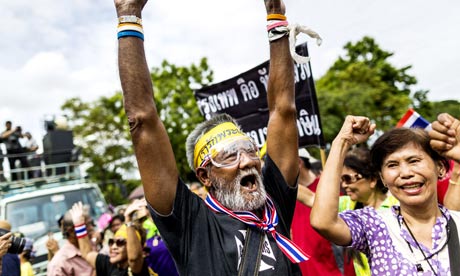Bangkok braces for anti-Thaksin protests
Thai police deploy 30,000 officers in response to protest over amnesty bill that opponents fear could lead to ex-PM's return
Kate Hodal in Bangkok
The Guardian, Tuesday 6 August 2013 17.46 BST

Protests against Thaksin Shinawatra and his sister Yingluck in Bangkok. Photograph: Zuma/Rex Features
Thailand's capital has closed schools, deployed thousands of police and invoked temporary security powers in preparation for planned protests on Wednesday against an amnesty bill that opponents fear could lead to the return of the deposed prime minister Thaksin Shinawatra.
The bill, proposed by the ruling Pheu Thai party, is highly contentious as it would broadly absolve those arrested, charged and prosecuted for political activities after the 2006 military coup that overthrew Thaksin.
It would not provide amnesty to protest leaders or government authorities, but opponents fear that it could be stretched to clear the return of Thaksin, who was charged with conflict of interest after his ousting and sentenced to two years' imprisonment.
Thaksin has avoided the charges by living in self-exile abroad, although it is widely believed that he still leads the country by proxy through his sister Yingluck, the current prime minister.
On Sunday about 1,000 people turned out in Bangkok for a peaceful protest organised by a group known as the People's Army against the Thaksin Regime. Organisers hope for a far greater turnout on Wednesday.
Police deployed 30,000 officers at key locations around the city, including parliament and the prime minister's office compound. An internal security act has been invoked until 10 August, allowing the government to impose curfews, close roads and ban the use of electronic devices in designated areas.
Tul Sittisomwong, a Thaksin opponent who will be protesting on Wednesday, said: "At the end of the day, at the end of this deadlock, Thaksin will be set free. To set Thaksin free they have to set everybody free … Pheu Thai says it's to put peace back into the country but it's not, it's just to put Thaksin back into power. That's the plan."
Six versions of the amnesty bill are being circulated, but only one has been tabled for discussion in parliament on Wednesday. The bill is intended to help stoke political reconciliation after the 2006 coup.
In 2008 Thaksin opponents occupied the prime minister's compound for three months and Bangkok's two airports for a week. In 2010 90 people were killed and 2,000 injured when Thaksin supporters occupied downtown Bangkok before being bloodily ousted by the army.
Amnesty International has called the bill "an insult to the victims and families of the 2010 violence", as it would also exonerate soldiers and army commanders involved in the deaths or injuries of protesters.
The political tension and threat of possible violence during this week's protests have stoked rumours of a potential coup against Yingluck's government – claims the army has denied.
The government has clamped down on those spreading such rumours, with four Facebook users – among them the political editor of a public TV channel – under investigation by police for allegedly spreading false information. They could face up to five years' imprisonment and a heavy fine if charged and convicted.
Thitinan Pongsudhirak, a political scientist at Bangkok's Chulalongkorn University, said the protests demonstrated a disenchantment" with the government but it was highly unlikely that they would overthrow it.
"The protest really is designed to unseat the government. But the anti-Thaksin coalition is not united, there is unlikely to be any intervention by the military or the judiciary, and there is not enough traction, not enough numbers [from the protesters], for them to really succeed," he said.
